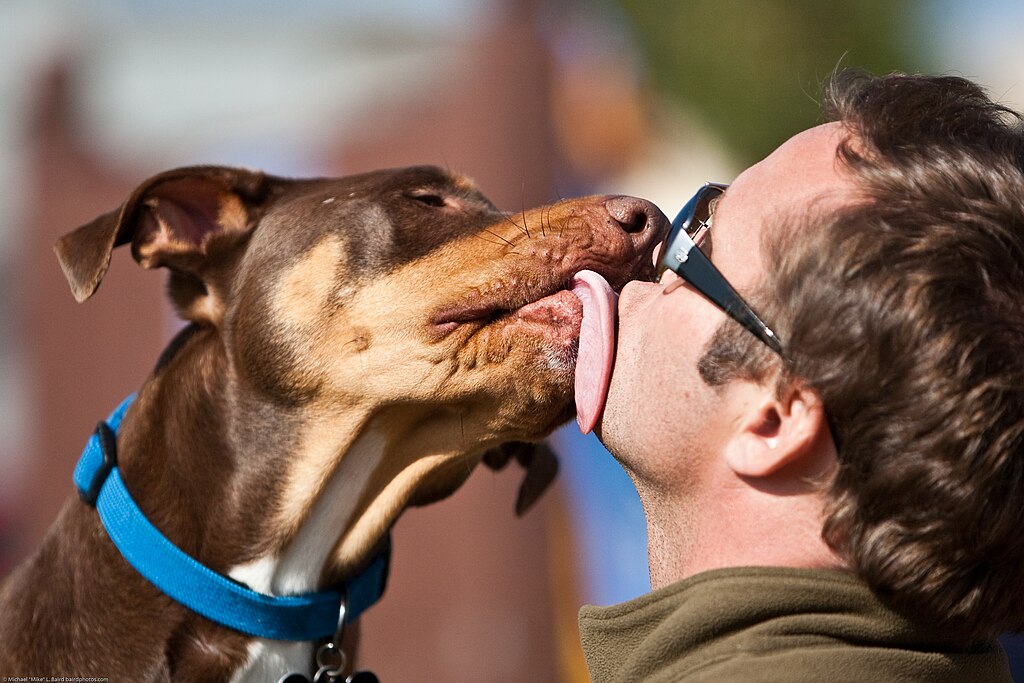Statistics reveal that almost all pet owners consider their pets to be part of the family. Given these realities, it’s no surprise that kissing animals living under the same roof as their owners is common practice. But is it safe?
We at Bright Side want you to know what hidden dangers could be lurking in giving your four-legged friend a big hug and kiss.
We at Bright Side want you to know what hidden dangers could be lurking in giving your four-legged friend a big hug and kiss.
Are dogs’ mouths really cleaner than human mouths?
That’s a total myth. Marty Becker, author of Chicken Soup for the Soul of the Dog Owner, dispels this popular prejudice when he says, "All you have to do is look, watch, smell, and you’ll realize that is not true. They raid the garbage can. You know, we give each other a peck on the cheek when we say hello; they give each other a peck on the rear end."
How many bacteria are there in dogs’ saliva?
This is what John Oxford, professor of virology and bacteriology at the Queen Mary University in London, says about how many bacteria your dog’s muzzle and mouth can carry: "It is not just what is carried in saliva. Dogs spend half their life with their noses in nasty corners or hovering over dog droppings so their muzzles are full of bacteria, viruses, and germs of all sorts."
What might happen if these bacteria get into the human body?
These viruses and germs can cause serious health problems in humans. This is what happened to one British woman who contracted an infection from her dog’s saliva. She began to notice that her speech sounded more and more slurred. Blood tests revealed that she had an infection due to capnocytophaga canimorsus bacteria, commonly found in the mouths of dogs and cats. There were also 13 similar incidents across the UK.
What other diseases can you catch from your pets?
Ringworm infection is one of the most common diseases that you can get from kissing your dog. If your pet is infected with ringworm and you kiss them, then you’ll catch this disease too.
MRSA infection usually affects the skin, and it can be caused by just one lick from your dog.
Capnocytophaga сanimorsus is a bacterium that can cause serious health problems if it enters your body through an open wound.
MRSA infection usually affects the skin, and it can be caused by just one lick from your dog.
Capnocytophaga сanimorsus is a bacterium that can cause serious health problems if it enters your body through an open wound.
How to prevent health risks associated with owning a pet
Always follow these rules:
- Don’t kiss your animals, don’t let them lick your face, don’t ever feed your pets at the table, and never share your dishes with them.
- Wash your hands thoroughly after having any contact with animals.
- Vaccinate your pet against common diseases promptly.
- Use special antibacterial and antifungal shampoos when you wash your furry friends.
- Make sure your dog or cat has no contact with wild or stray animals of any kind. When walking your dog, watch that they do not eat anything off the street.
- Don’t feed your four-legged friends raw eggs, meat, or fish.
- Regularly clean and disinfect your pet’s feeding bowl, and do general cleaning in the house using disinfecting solutions.
- See your vet immediately if your pet is not feeling well, if he or she refuses to eat, or suffers from digestive disorders.

No comments:
Post a Comment